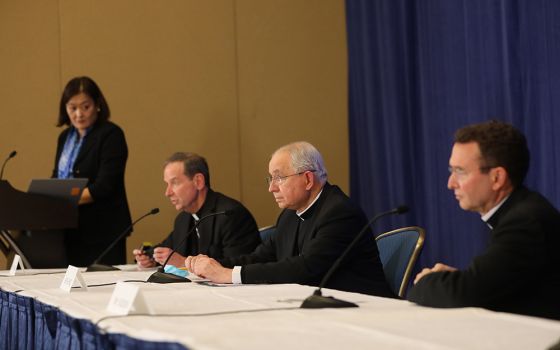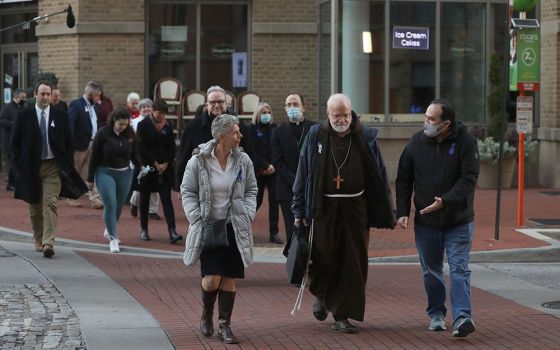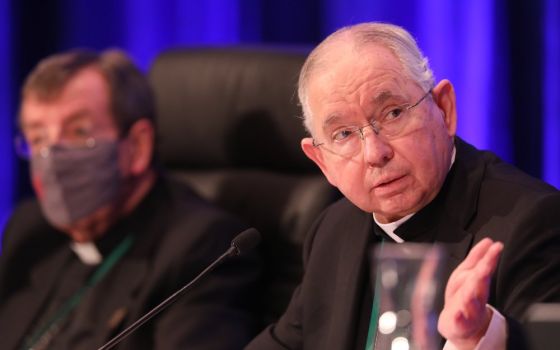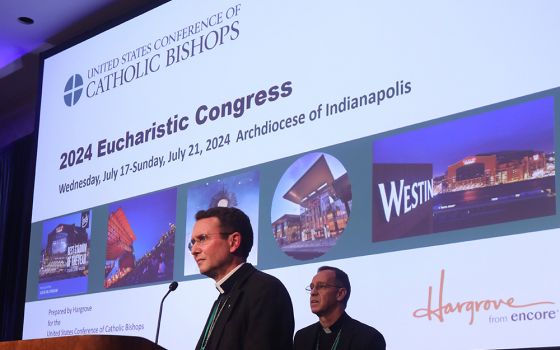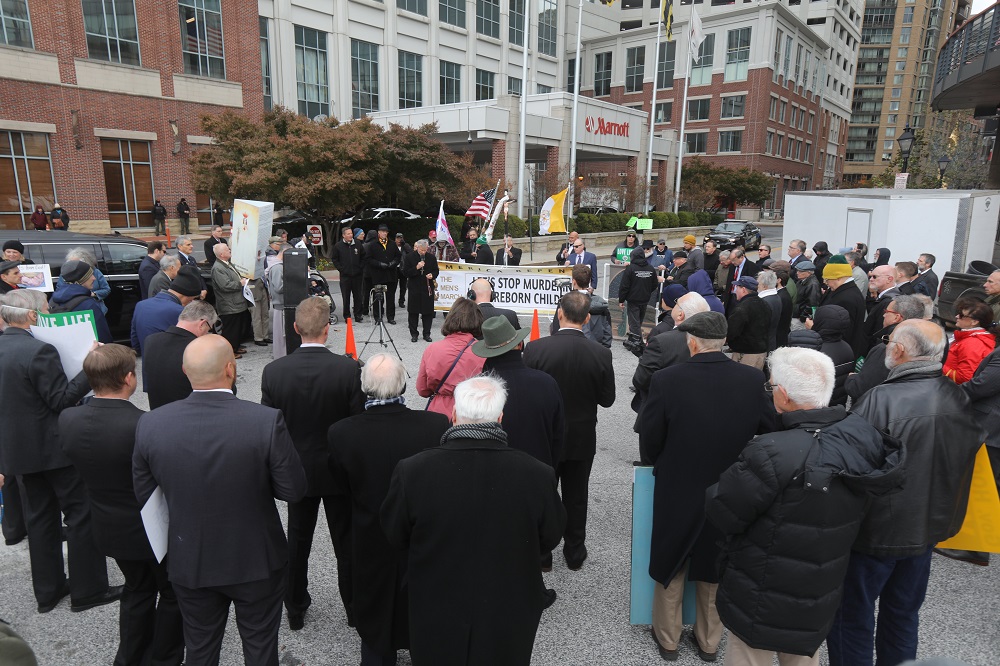
A clergyman leads a rosary with the National Men's March to End Abortion organizers Nov. 15, outside the hotel in Baltimore where the fall general assembly of the U.S. Conference of Catholic Bishops is being held Nov. 15-18. Due to the COVID-19 pandemic, it is the first in-person bishops' meeting since 2019. (CNS/Bob Roller)
Reporting from Baltimore for the first time in two years! The U.S. bishops have gathered for their first post-pandemic in-person meeting and everything — from boarding a plane to going out to a nice restaurant for dinner to watching the bishops interact with each other and with the occasional protester who accosts them — makes it feel like things are getting back to normal.
In past years, the U.S. bishops started their first public session on Monday morning, with journalists seated at tables along the right side of the large third-floor ballroom. This year, the bishops began with a morning of reflection and two closed-door sessions in the afternoon: the first for regional meetings and the second for executive session. With the bishops behind closed doors, journalists had to look elsewhere to see what was going on.
Outside, about 200 conservative Catholics gathered for a protest. When I walked over to listen, Michael Hichborn of the Lepanto Institute was shouting about the need to enforce Canon 915, which he thinks requires the bishops to deny Communion to pro-choice politicians. (It doesn't.) It was cold and windy so most of the crowd kept their hands in their pockets and did not applaud, but his assertions were met with nods and people saying, "That’s right." Behind him, someone waved an American flag and another had a papal flag. The latter caught me by surprise because Pope Francis is not too popular with this crowd.
Inside, the conservatives were meeting also. Monday morning, the first people I saw sitting together upon entering the hotel bar were David Scott, Archbishop José Gomez’s consigliere, and Michael Warsaw, the CEO of EWTN. I am guessing they were not meeting to plan a Pope Francis fan club. Maybe a social justice march? Nah. I turned to a colleague and asked, "How many times do you think I will need to pen the phrase 'deeply sinister' this week?"
Later, someone standing in the lobby was passing out flyers that denounced Pope Francis. I saw him give one to a group of bishops, but they were all wearing masks so he did not realize he had mumbled his words about Pope Francis being a heretic to some of the pope's strongest supporters. Masks not only help limit the spread of the coronavirus, they help make it harder for protesters to recognize bishops. The conference organizers should consider insisting on masks even after the pandemic.
Advertisement
As I reported previously, even the bishops who think it was mistake to draft a document on the Eucharist in the first place, and many of those who think the draft is lousy, may end up voting for the text just to put the issue behind them. It is the path of least resistance, one bishop said to me. Everyone it seems is looking for an off-ramp and several bishops indicated the executive session discussion had been surprisingly calm, that a consensus seemed to be emerging that the text on the Eucharist was a compromise and probably the best they could agree to.
What changed from June when a quarter of the bishops voted not to proceed with even drafting the text? Bishops usually try to support the work of the conference and its committees. For some bishops, ideological considerations are paramount but for many, perhaps most bishops, other considerations come into play such as supporting each other.
In June, the Committee on Doctrine requested permission to draft a document on the Eucharist and the centrist bishops did not want to embarrass them. Now that same committee has brought forward a text and those same centrist bishops will want to vote for the text. The only thing that might dissuade them would be the addition, during the public discussion of the document Tuesday afternoon (Nov. 16), of a poison pill amendment, something that reflects the desire of the protesters outside to formally deny Communion to the president and other pro-choice politicians.
At the close of the first full day of meetings, all of them behind closed doors, most bishops thought they could defeat a poison pill amendment, but I am not so sure. Never has the conference voted against an amendment that had the effect of making a document stronger in its condemnation of abortion. Never.





